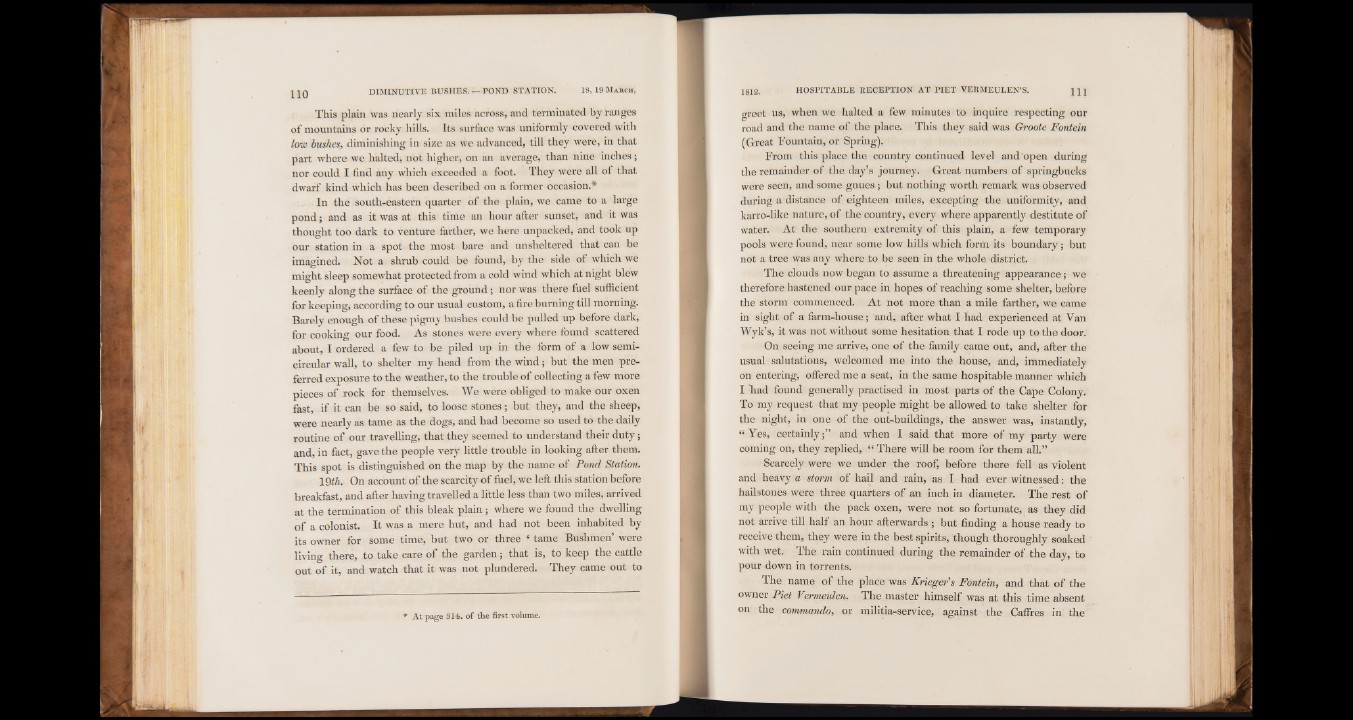
This plain was nearly six miles across, and terminated by ranges
of mountains or rocky hills. Its surface was uniformly covered with
low bushes, diminishing in size as we advanced, till they were, in that
part where we halted, not higher, on an average, than nine inches;
nor could I find any which exceeded a foot. They were all of that
dwarf kind which has been described on a former occasion.*
In the south-eastern quarter of the plain, we came to a large
pond; and as it was at this time an hour after sunset, and it was
thought too dark to venture farther, we here unpacked, and took up
our station in a spot the most bare and unsheltered that can be
imagined. Not a shrub could be found, by the side of which we
might sleep somewhat protected from a cold wind which at night blew
keenly along the surface of the ground; nor was there fuel sufficient
for keeping, according to our usual custom, a fire burning till morning.
Barely enough of these pigmy bushes could be pulled up before dark,
for cooking our food. As stones were every where found scattered
about, I ordered a few to be piled up in the form of a low semicircular
wall, to shelter my head from the wind; but the men preferred
exposure to the weather, to the trouble of collecting a few more
pieces of rock for themselves. We were obliged to make our oxen
fast, if it can be so said, to loose stones; but they, and the sheep,
were nearly as tame as the dogs, and had become so used to the daily
routine of our travelling, that they seemed to understand their duty;
and, in fact, gave the people very little trouble in looking after them.
This spot is distinguished on the map by the name of Pond Station.
19th. On account of the scarcity of fuel, we left this station before
breakfast, and after having travelled a little less than two miles, arrived
at the termination of this bleak plain; where we found the dwelling
of a colonist. It was a mere hut, and had not been inhabited by
its owner for some time, but two or three ‘ tame Bushmen’ were
living there, to take care of the garden; that is, to keep the cattle
out of it, and watch that it was not plundered. They came out to
greet us, when we halted a few minutes to inquire respecting our
road and the name of the place. This they said was Groote Fontein
(Great Fountain, or Spring). !
From this place the country continued level and'open during
the remainder of the day’s journey. Great numbers of springbucks
were seen, and some gnues; but nothing worth remark was observed
during a distance of eighteen miles, excepting the uniformity, and
karro-like nature, of the country, every where apparently destitute of
water. At the southern extremity of this plain, a few temporary
pools were found, near some low hills which form its boundary; but
not a tree was any where to be seen in the whole district.
The clouds now began to assume a threatening appearance; we
therefore hastened our pace in hopes of reaching some shelter, before
the storm commenced. At not more than a mile farther, we came
in sight of a farm-house; and, after what I had experienced at Van
Wyk’s, it was not without some hesitation that I rode up to the door.
On seeing me arrive, one of the family came out, and, after the
usual salutations, welcomed me into the house, and, immediately
on entering, offered me a seat, in the same hospitable manner which
I had found generally practised in most parts of the Cape Colony.
To my request that my people might be allowed to take shelter for
the night, in one of the out-buildings, the answer was, instantly,
“ Yes, ce rta in ly a n d when I said that more of my party were
coming on, they replied, “ There will be room for them all.”
Scarcely were we under the roof, before there fell as violent
and heavy a storm of hail and rain, as I had ever witnessed: the
hailstones were three quarters of an inch in diameter. The rest of
my people with the pack oxen, were not so fortunate, as they did
not arrive till half an hour afterwards ; but finding a house ready to
receive them, they were in the best spirits, though thoroughly soaked
with wet. The rain continued during the remainder of the day, to
pour down in torrents.
The name of the place was Krieger’s Fontein, and that of the
owner Piet Vermeulen. The master himself was at this time absent
on the commando, or militia-service, against the Caftres in the